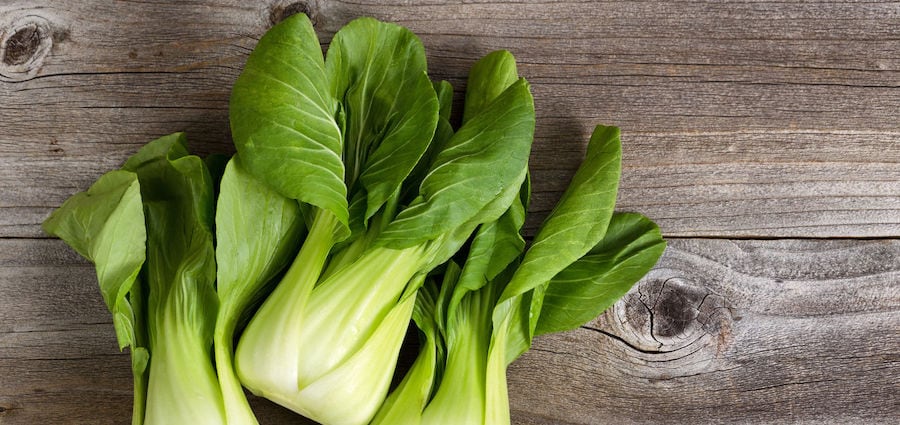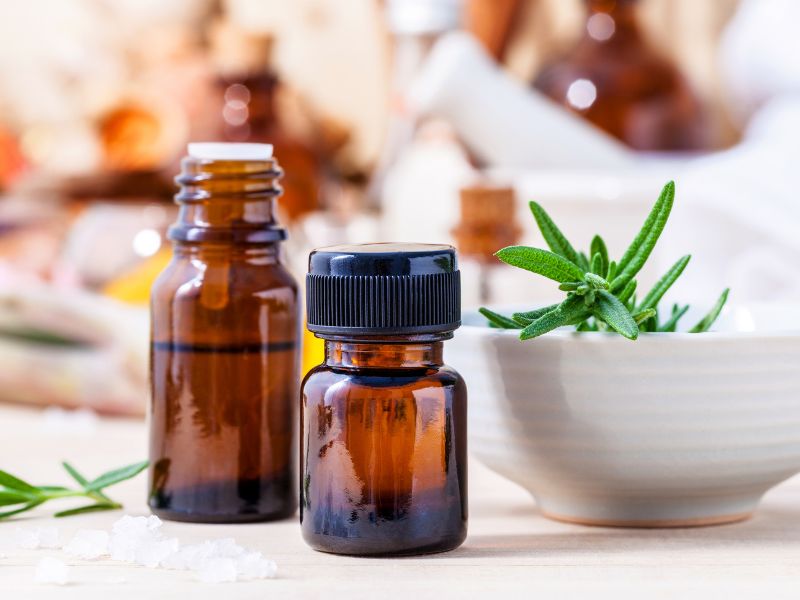Spring is on its way! The air is fresh, the cherry blossoms are blooming, and everyone is going green for St. Paddy’s Day! After a long winter—potentially filled with poor holistic nutrition choices (I’m looking at you, heart-shaped Valentine’s Day cookie!)—it’s time to re-balance with some healthy food. Want to know exactly what your holistic nutritionist or certified nutrition consultant is doing for her health this spring? She’s eating TONS of green veggies! So if you’re looking for the best way to get your “healthy” Irish pride on today, go green by whipping up a fresh salad, casserole, or platter with these 10 green superfoods!
10. Endive
A great addition to a spring salad, endive is extremely high in vitamins K and A, and is an excellent source of calcium.[1] Try mixing endive with a variety of raw veggies like arugula, sprouts, or even weeds such as dandelion or cleavers for a powerful addition to your holistic nutrition routine.
9. Kelp
While your certified nutrition consultant may tell you that sea veggies may not be for everyone, kelp is packed with healthy minerals, including calcium and folic acid.[2] Kelp is also an ideal source of iodine, which is often difficult to include in our daily holistic diets. Looking for a substitute for salt? Try sprinkling kelp granules onto your sandwiches and into your soups and stews.
8. Leeks
Looking to add some zesty flavor to your spring cooking? Instead of onions, try tossing in some leeks, which are high vitamins A, K, and folic acid.[3] They are also an ideal centerpiece for a lively spring salad!
7. Okra
High in vitamins A, K, and C with a nice side dish of the mood-boosting mineral, phosphorus,[4] okra is a lovely addition to any soup or an Asian-fusion salad.
6. Bok choy
Why not put a little Chinese-fusion into your corned beef and cabbage by using bok choy (Chinese cabbage), which is higher in both vitamin A and calcium than traditional cabbage.[5] [6]
5. Avocados
Ah, one of my most beloved mood boosting foods. High in folic acid and vitamin K,[7] you know this green superfood is on your holistic nutritionist’s organic grocery list. Avocados are a wonderful addition to a veggie-burger, and even an ideal substitute for eggs in a vegan Cobb salad!
4. Turnip greens
These nutritious greens are a friend to strong, healthy bones! 1 cup of turnip greens contains 197 milligrams of calcium.[8] You can always add a little spin to your Saint Paddy’s Day and sauté or steam up some vegan “corned beef and turnip greens” instead of the traditional “corned beef and cabbage!”
3. Swiss chard
A wonderful green veggie to add a little Mediterranean flare to your holistic nutrition, Swiss chard is ranked #2 (second to spinach) in The World’s Healthiest Foods’s analysis of total nutrient-rich vegetables.[9] Swiss chard is not only exceedingly high in vitamin K, but one cup of boiled Swiss chard contains a whopping (drumroll please)… 31.5 miligrams of vitamin C![10] You won’t need any “luck” of the Irish when it comes to holistic nutrition with this green superfood on your plate.
2. Kale
All right, all right. You saw this one coming. But did you really think I was going to leave my beloved kale—a powerhouse veggie high in vitamins K, C, A, phosphorus, and magnesium[11]—off this list? I didn’t think so. Toast to your spring health by whizzing up one of my delicious Kale Cherry Berry smoothies!
1. Spinach
Yes, it’s Popeye’s secret weapon. Why? Because spinach is packed FULL of vitamins and essential nutrients such as vitamins K, C, A, magnesium, calcium, and phosphorus[12]—making this chenopod the mother of all superfoods, and an essential part of your holistic nutrition! Don’t believe me? Just take a quick gander at the USDA nutrition facts for spinach, and then tell me this won’t be the centerpiece of your Saint Paddy’s Day dinner. Just eat it organic and fresh instead of from a can or your certified nutrition consultant will have a fit! That means you too, Popeye!
Now that you know what your holistic nutritionist or certified nutrition consultant will be eating on Saint Patrick’s Day, leave me a comment and tell me which green superfoods you’ll be enjoying this spring!
Interested in receiving an online nutrition degree and learning more about green superfoods, vitamins, and how our diets can affect everyday health? Check out the accredited holistic nutrition programs online from the American College of Healthcare Sciences!
This article is for informational purposes only. It is not intended to treat, diagnose, cure, or prevent disease. This article has not been reviewed by the FDA. Always consult with your primary care physician or naturopathic doctor before making any significant changes to your health and wellness routine.
Agricultural Research Service United States Department of Agriculture, National Nutrient Database for Standard Reference. (2014). Foods List. Retrieved from http://ndb.nal.usda.gov/ndb/search/list
[1] Endive, raw: http://ndb.nal.usda.gov/ndb/foods/show/3014?qlookup=11213&max=25&man=&lfacet=&new=1
[2] Seaweed, kelp, raw: http://ndb.nal.usda.gov/ndb/foods/show/3205?fg=&man=&lfacet=&count=&max=25&sort=&qlookup=kelp&offset=&format=Full&new=&measureby=
[3] Leeks, raw: http://ndb.nal.usda.gov/ndb/foods/show/3043?fg=&man=&lfacet=&format=&count=&max=25&offset=&sort=&qlookup=leeks
[4] Okra, raw: http://ndb.nal.usda.gov/ndb/foods/show/3073?fg=&man=&lfacet=&format=&count=&max=25&offset=&sort=&qlookup=okra
[5] Cabbage, raw: http://ndb.nal.usda.gov/ndb/foods/show/2937?fg=&man=&lfacet=&format=&count=&max=25&offset=&sort=&qlookup=cabbage
[6] Cabbage, chinese (pak-choi), raw: http://ndb.nal.usda.gov/ndb/foods/show/2943?fg=&man=&lfacet=&format=&count=&max=25&offset=&sort=&qlookup=bok+choy
[7] Avocados, raw, California: http://ndb.nal.usda.gov/ndb/foods/show/2235?fg=&man=&lfacet=&format=&count=&max=25&offset=&sort=&qlookup=avocado
[8] Turnip greens and turnips, frozen, unprepared: http://ndb.nal.usda.gov/ndb/foods/show/3295?fg=&man=&lfacet=&format=&count=&max=25&offset=&sort=&qlookup=turnip+greens
[9] The World’s Healthiest Foods. http://www.whfoods.com/ Swiss Chard. (2014). Retrieved from http://www.whfoods.com/genpage.php?tname=foodspice&dbid=16
[10] Chard, swiss, cooked, boiled, drained, without salt: http://ndb.nal.usda.gov/ndb/foods/show/2966?fg=&man=&lfacet=&count=&max=25&sort=&qlookup=chard&offset=&format=Full&new=&measureby=
[11] Kale, raw: http://ndb.nal.usda.gov/ndb/foods/show/3030?fg=&man=&lfacet=&format=&count=&max=25&offset=&sort=&qlookup=kale
[12] Spinach, raw: http://ndb.nal.usda.gov/ndb/foods/show/3214?fg=&man=&lfacet=&format=&count=&max=25&offset=&sort=&qlookup=spinach
Disclosure of Material Connection: I am the CSO of American College of Healthcare Sciences, the Institution that publishes this blog. However, all opinions are our own. If this blog contains affiliate links, they will be marked with an asterisk. I am disclosing this in accordance with the Federal Trade Commission’s 16 CFR, Part 255: “Guides Concerning the Use of Endorsements and Testimonials in Advertising.”
This article is for informational purposes only. It is not intended to treat, diagnose, cure, or prevent disease. This article has not been reviewed by the FDA. Always consult with your primary care physician or naturopathic doctor before making any significant changes to your health and wellness routine.
Editor’s Note: This blog post was originally published in April 2014 and has been updated for accuracy. (March 2018)




